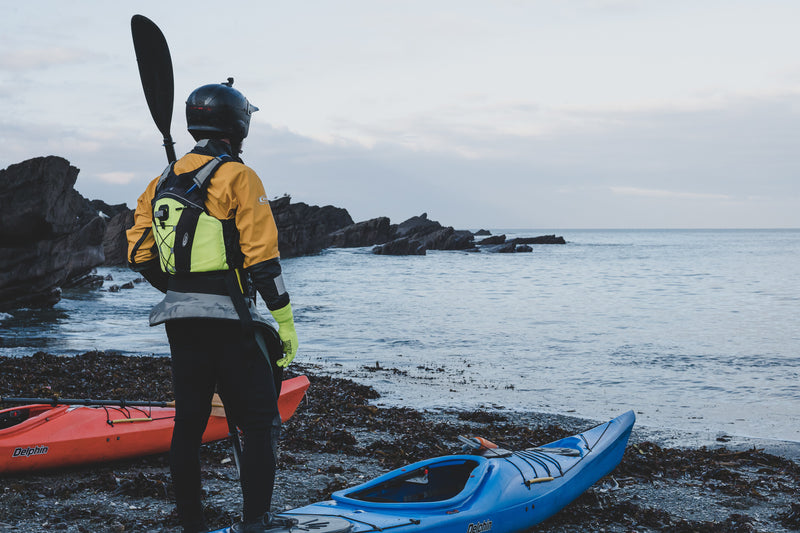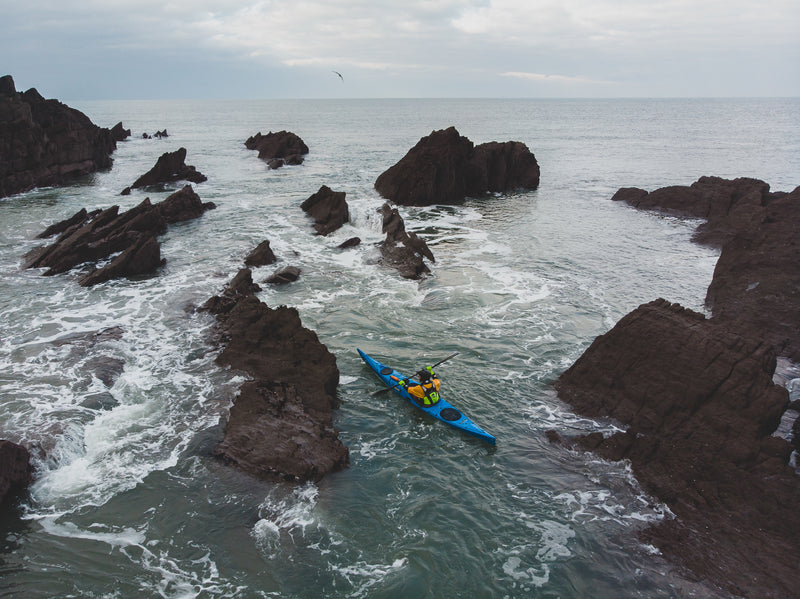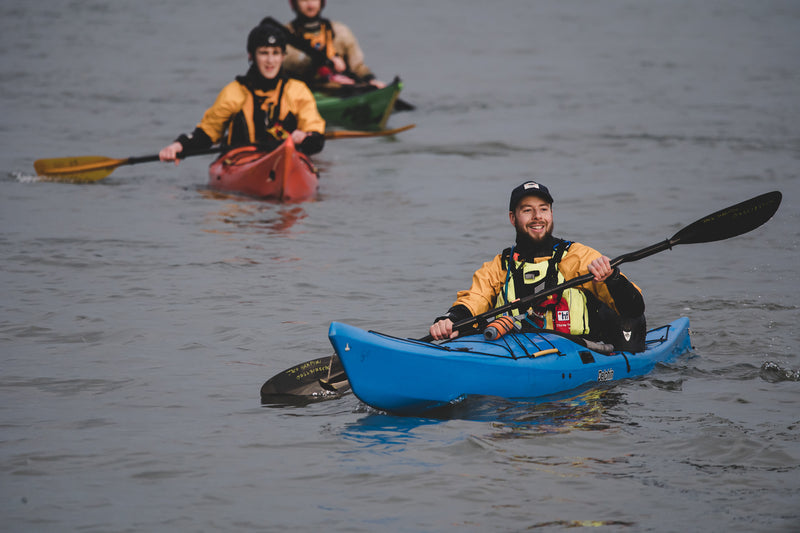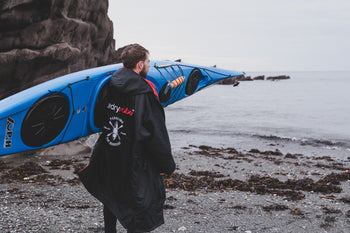9 Minuten Lesezeit
From the age of 18, Jack Hampton has been passionate about paddling on some incredible kayaking journeys. His next great expedition is part of a project called Paddling the Margins, and it is one of his most important kayaking challenges to date.
Jack and his team are set to paddle from Alaska to Seattle, on an exploration of sustainability. The journey will take the kayakers to geographic and socioeconomic marginal areas that are susceptible to climate change. The expedition aims to elevate the voices of those who have learned to live and manage in harsh and natural environments - all the while documenting the expedition. With this at the heart of the expedition, the other key mission of the exciting odyssey is to spark inspiration and to encourage others to pursue their adventure dreams!
We were keen to chat with Jack before his expedition, to find out more about what the expedition is hoping to discover, why completing the expedition with like-minded friends was important to the challenge, and what training the team has completed in preparation for this incredible expedition.

How did the project come about and what is the focus behind the incredible expedition?
When I was 18, a friend and I set off on a mad kayaking journey paddling from Finland to Norway with little planning and no experience. We were woefully ill-equipped… And had the best time! The experience gave me a passion for the kayak as a means of exploring and building bonds with people and places.
Since then, I have loved sharing kayaking and adventures with friends, growing more capable and confident on the water. All of this came from a teenager’s reckless enthusiasm, from going for it and having an adventure, but now I want to use what I have learned to contribute to something I believe in.
The focus of Paddling the Margins is finding and broadcasting lessons on how we can move to a balanced relationship with nature from those at the margins who experience that growing struggle in an acute and frightening way. We plan to ask questions, reflect on challenges and, if possible, maybe even find some answers by telling the stories of those whose voices are as yet unheard.
Tell us about the route of the expedition and where you will be visiting.
We will be starting in Ketchikan, Alaska, paddling south over the border into Canada, and then along the entire Canadian west coast before finishing back in the US in Seattle.
In the northern section, we will be paddling between remote First Nation communities in Prince Rupert, Klemtu, Bella Bella, and Namu before we enter Johnstone Strait - the waterway between Vancouver Island and the mainland. We will paddle along the east coast of Vancouver Island until we reach Campbell River from where we will island-hop to Nanaimo. Finally, we will paddle through the stunning San Juan Islands and along Puget Sound, before finishing in Seattle.

The team consists of skilled and experienced kayakers, but have there been any key kayaking skills you needed to learn in preparation for this expedition?
Actually, when the idea for the trip was first forming, I was the only skilled or experienced paddler in the group. However, I decided that I would rather complete this long journey in the company of friends, even if this meant teaching them to paddle first, than with experienced paddlers who I don’t know as well or who don’t share the wider sustainability goals of the project. Therefore, over the last 3 years, the awesome paddlers from Bideford Canoe Club and I have put Josh, James, Immie, and Nick through their paces, taking them from never sitting in a boat before to being expedition-ready.
In terms of skills, the team has learned to brace and use support strokes in the surf zone, to self-rescue, and even to roll, but most importantly they have focused on improving their forward paddling technique - the most important element of expedition paddling for everyday efficiency and injury prevention.
In addition to this, I have completed several advanced kayaking courses, passing my Tidal Sea Kayak Leader, Advanced Sea Kayak Award, and Open Water Navigation and Tidal Planning qualifications.

Have there been any challenges in preparing for the expedition and how did you overcome them?
Time! All the team have full-time day jobs, Jack, Immie, and Nick have been completing Masters alongside work over the last two years, and the boys all play hockey at a high level so balancing work, study, hockey, and expedition planning has been tough.
The other main challenge is funding. Undertaking an expedition of this size requires a fair amount of money, and although we hope to prove during this expedition that you don’t need to be a public name or have sponsorship from companies like Red Bull to turn a dream adventure into a reality, it has been tricky to find the money we need. This has been made harder by the pandemic as many funders closed their grant programmes or reduced their grant making.
Luckily, we have managed to secure some funding from TransGlobe Expedition Trust and the Jeremy Willson Charitable Trust and sponsorship from companies like dryrobe® which means the expedition can go ahead! We particularly appreciate dryrobe®’s support of the film project.
We still require some further funding for the film project so if you, like us, think this is a worthwhile project and would like to support it please do get in touch via the website.

What makes the threat of climate change and habitat destruction so significant for marginal groups, living at the edge of North American society and geography?
This project is about marginal spaces in both a geographic and socioeconomic sense because the margins are particularly susceptible to climate change.
The First Nations peoples of the Northwest coast have, according to archaeological records, achieved a sustainable and resilient relationship with their environment for over two millennia. However, in recent decades, the people along this coastline are facing significant challenges as a result of manmade climate change: rising sea levels, shifting currents, depleted marine stocks, flash floods, and blazing wildfires.
Every day these communities have to make trade-offs between their economic, cultural, and environmental needs. While there is a need to decarbonise and reduce extraction, in communities that have relied on extractive industries such as fishing and logging for centuries, and where other economic opportunities are scarce, this can contribute to poverty and sociocultural dislocation.
The Pacific Northwest provides an incredible opportunity to explore these issues in more depth, start imagining what a more sustainable relationship with nature could look like, and how economic, sociocultural, and environmental needs can be balanced.
What are you hoping to discover from the expedition and how are you hoping to make the findings from the expedition accessible?
Our hopes are two-fold. Firstly, we are hoping to find compelling stories of sustainable living from which we can all take lessons, and continue tackling climate change on an individual level.
Secondly, we are hoping to raise the profile of the victims of climate change and the complex trade-offs which lie behind a sustainable transition.
We will make two films about the project, one focusing on sustainability and the other on the expedition itself to encourage others to turn their adventure dream into a reality. These will be entered into the outdoor film festival circuit and then posted on YouTube for free access. During the journey we will keep a regular blog on our website and will be posting frequent updates, clips and vlogs on our social media channels so please follow and check them out (see below)! We also hope to do speaker events and screenings when we return.
 An increasing number of people are dealing with climate change anxiety. Is this something you have experienced yourself and has it acted as a motivator for the expedition? Do you have any advice for those who are experiencing it?
An increasing number of people are dealing with climate change anxiety. Is this something you have experienced yourself and has it acted as a motivator for the expedition? Do you have any advice for those who are experiencing it?
All the team have experienced climate anxiety but also climate guilt! The climate challenge is so urgent that the guilt whenever you use single-use plastic or book a flight is a constant for all of us and for so many people.
While researching this project our awareness of our own actions has increased and some of the team have made lifestyle changes as a result.
Our advice is to celebrate the small wins and not to internalise that guilt – instead, direct it towards the big players who really need to change! You can only directly control so much, but small actions add up. Feel good about picking up that plastic you walk past on the beach and use your voice wherever you can to let major polluters know where the obligation lies.

We can’t wait to see the final film of the expedition! How long after the expedition will the film be ready to check out and how can it be watched?
We hope to release the films in 2023 – follow our social media feeds for updates on where and when you can catch them!

Find out more about Paddling the Margins and the phenomenal expedition here:
www.paddlingthemargins.com
Follow Paddling the Margins:
Instagram: @paddlingthemargins
Twitter: @JackHam23052209
Photos by N and M Dro-tography
#dryrobeterritory
Published on February 05, 2022
